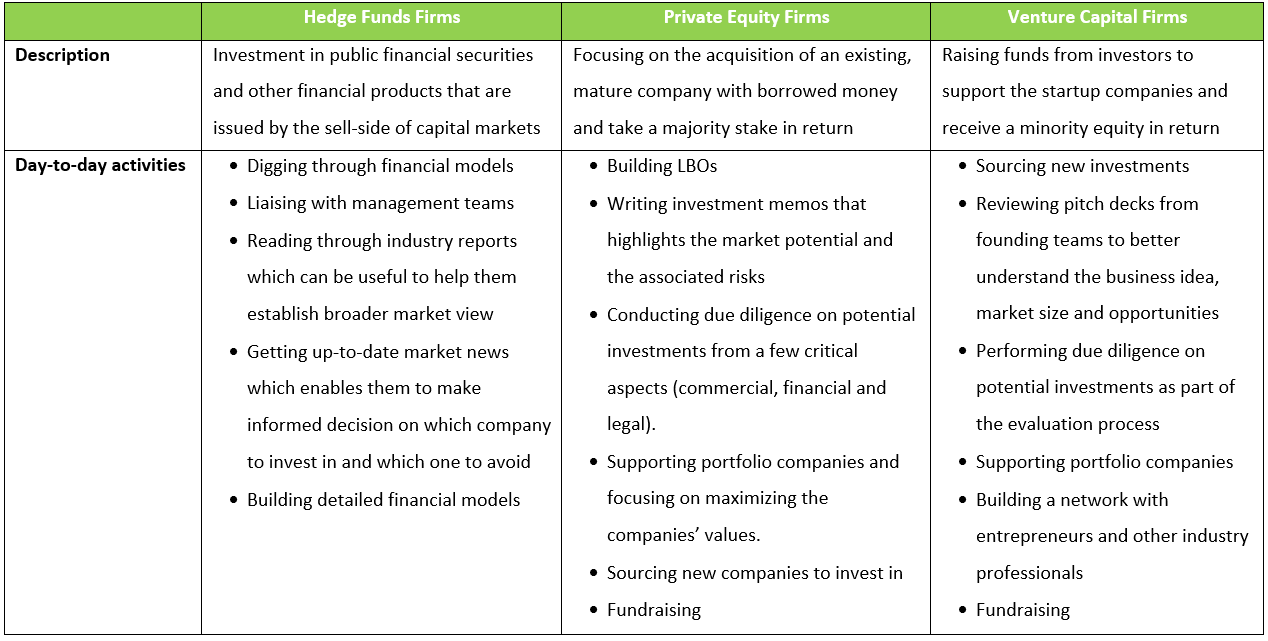by jiawen
Share
Share
About Hedge Funds
Hedge funds focus on pooling money primarily from accredited investors and investing it in public financial securities such as stocks, fixed income assets, commodities and so on. There are various strategies that hedge fund managers will employ to generate better returns for their investors and reduce their risk exposure. This includes long/short equity, event-driven and market arbitrage to name a few. The fund managers will invest in different securities and equities that match the said strategy in order to maximise the returns despite market fluctuations.
Read More: How to start a hedge fund in Singapore
About Private Equity
On the other hand, private equity (PE) firms tend to focus more on leveraged buyout transactions (LBOs). A leveraged buyout refers to the acquisition of an existing company by a PE firm using a relatively large portion of outside debt financing while the balance is funded with their own equity. The PE firm will then make operational improvements to the company and help to improve its financial health by paying off as much debt as possible using company’s cash flows. When the company’s valuation is getting higher and the timing is right, the PE firm will exit the investment through initial public offerings (IPOs) or sell the portfolio company to interested party. The exit of investment often takes place between three to seven years after the initial investment.
About Venture Capital
A venture capital is a form of private equity that investors provide to fund the startup companies in their early stage with long-term growth potential. They will receive a minority equity (50% or less) in return. In addition, venture capital investors will help entrepreneurs to build their businesses from the ground up based on their strong knowledge of the financial markets and diversified social circles. In the decision-making process, venture capitalists will first assess the company based on their growth potential, management team and the competitive advantage of the product or service. It is a high-risk high-reward industry and the venture capitalists who are risk takers shall expect the returns to come 7 to 10 years later.

Compliance should not slow a fund down. We support VCFMs with right-sized, cost-efficient compliance that scales as you grow, so you can focus on investing while regulatory expectations are met.
Singapore remains one of the world’s top destinations for fund managers, managing S$6.07 trillion in assets as of December 2024. To operate locally, all fund management companies must be licensed or registered with the Monetary Authority of Singapore (MAS) under the Securities and Futures Act (SFA). This guide outlines the key licensing requirements under MAS’s latest framework.
On 25 September 2025, the Monetary Authority of Singapore (MAS) issued the Guidelines on Standards of Conduct for Digital Advertising Activities. These new rules, effective 25 March 2026, apply to all financial institutions (FIs) and their appointed digital marketers — including agencies, affiliates, and influencers (“finfluencers”).
Following Russia’s invasion of Ukraine, Singapore imposed targeted financial measures under MAS’s notice dated 13 March 2022. These measures prohibit financial institutions from conducting transactions or providing financial assistance to designated Russian banks, entities, and individuals. Institutions must freeze related assets and restrict dealings involving controlled strategic or dual-use goods bound for Russia. MAS’s directive highlights the importance of vigilance, robust due diligence, and strong compliance controls to ensure adherence to Singapore’s sanctions regime.






